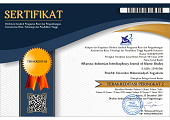The Perception of Indonesian Millenial on Da’i: Knowledge, Presentation and Performance
Abstract
As a generation which has a unique character, the millennial generation is often percieved as a generation that is fashionable, world-accessible, and priotitizes simplicity. This study examines the perception of the millennial generation on the performance of da’i, specifically regarding knowledge capacity, presentation methods, and appearance. In addition, this study also aims to measure their perception of global influence on religious life. The current study uses both qualitative and quantitative approaches to get the best result. The qualitative approach consists of literature review of previous research and in-depth interviews with experts and practitioners. While the quantitative approach is to use a single regression between the variables. The findings of this study state that demography, religiosity and knowledge have a significant influence on the preacher’s performance.
Keywords
Full Text:
PDFReferences
Ab. Aziz Mohd. Zin. (2005). Pengantar Dakwah Islamiah. Kuala Lumpur: Penerbit Universiti Malaya.
Abu al-Majd Nawfal. (1977). al-Dakwah Ila Allah; Khasaisuha, Muqawwimatuha, Manahijuha.
Abu Bakar Dhikri. al-Dakwah Ila al-Islam. Kaherah: Maktabah Dar al-`Arubah.
Ahmad bin Muhammad bin `Ali al-Ghoyumi. al-Misbah al-Munir. Mesir: Tab`ah Mustafa al-Babi al-Hallabi Wa Awladihi.
Mahfuz, Ali. (1975). Hidayah al-Murshidin Ila Turuq al-Wa`zi Wa al-Khithabah. Madinah: Maktabah al-`Ilmiyah.
Arli., Denni., Tkaczynski, Aaron., and Anandya, Dudi. (2019). “Are Religious Consumers More Ethical and Less Machiavellian? A Segmentation Study of Millennials.” International Journal of Consumer Studies 43 (3): 263–76. https://doi.org/10.1111/ijcs.12507.
Arskal, Salim. (2018). “Generasi Milenial Kunci Agen Dakwah Inovatif.” Republika.CO.ID, September 14, 2018. https://www.republika.co.id/berita/pf10ds384/generasi-milenial-kunci-agen-dakwah-inovatif.
Brodjonegoro, Bambang. (2018). “Milenial, Generasi ‘Seksi’ Yang Makin Diperebutkan.” Kompas.Com, 2018. https://pemilu.kompas.com/read/2018/09/22/211646821/milenial-generasi-seksi-yang-makin-diperebutkan.
Canary, Daniel J., and Dainton, Marianne. (2003). Maintaining Relationships Through Communication. 1st Editio.
Creswell, J.W. (2008). Research Design: Qualitative, Quantitative, and Mixed Methods Approaches. California: Sage Publications.
Ghozali, Imam. 2006. Aplikasi Analisis Multivariate Dengan Program SPSS (Edisi Ke 4). Semarang: Badan Penerbit Universitas Diponegoro, Semarang.
Aplikasi Analisis Multivariate Dengan Program IBM SPSS 21 Update PLS Regresi. Semarang: Badan Penerbit Universitas Diponegoro. 2013.
Aplikasi Analisis Multivariate Dengan Program SPSS. Semarang: Badan Penerbit Universitas Diponegoro. 2014.
Model Persamaan Struktural Konsep Dan Aplikasi Dengan Program AMOS 24. Semarang: Badan Penerbit Universitas Diponegoro. 2017
Groat, L., and D Wang. (2002). Architectural Research Methods. New York: John Wiley & Sons.
Kupperschmidt. (2000). “Tips to Help Your Recruit, Manage, and Keep Generation x Employees,” 2000. https://www.proquest.com/openview/9dd0159902f5fb35f459753fe26f2530/1?pq-origsite=gscholar&cbl=35336.
Moleong, L.J. (2011). Metodologi Penelitian Kualitatif Edisi Revisi. Bandung: PT. Remaja Rosdakarya.
Naqqiyah., Syahrotin, Maulidatus., and Nurdin, Ali. (2019). “Credibility of Islamic Preachers in the Post-Truth Era: A Study of Da’i in Surabaya.” Ilmu Dakwah: Academic Journal for Homiletic Studies 13 (2): 271–90. https://doi.org/10.15575/idajhs.v13i2.6725.
Nelson, Millicent F., Matrecia S.L. James, Angela Miles, Daniel L. Morrell, and Sally Sledge. (2017). “Academic Integrity of Millennials: The Impact of Religion and Spirituality.” Ethics and Behavior 27 (5): 385–400. https://doi.org/10.1080/10508422.2016.1158653.
A’yuninnisa, Nur’aini., Rizqi., Fashih Hibatul Haqqi, Muhammad., Balqish Rusli, Nisfi., and Puteri, Nabila. (2020). “Indonesian Implicit Leadership Theory: Typical and Positive Leadership Prototypes for Indonesian Millennials.” Asian Journal of Social Sciences and Management Studies 7 (1): 1–7. https://doi.org/10.20448/journal.500.2020.71.1.7.
Pew Research Center. (2010). “A Portrait of Generation Next.”
———. 2016. “Library Usage and Engagement.” Pew Research Center, 2016. https://www.pewresearch.org/internet/2016/09/09/library-usage-and-engagement/.
Alsop, Ron. (2008). “Who Are the Millennials?” Livescience.Com, 2008. https://www.livescience.com/38061-millennials-generation-y.html.
Sugiyono. (2017). Metode Penelitian Kuantitatif, Kualitatif, Dan R&D. Bandung: Alfabeta.
Thompson, Mark C. (2019). “The Impact of Globalization on Saudi Male Millennials’ Identity Narratives.” Asian Affairs 50 (3): 323–43. https://doi.org/10.1080/03068374.2019.1636512.
Jamal al –Din Muhammad bin Mukram ibn Manzur al-Ifriqi al-Misri 1956, Lisan al-`Arb. Beirut: Dar Sadir Wa Dar Beirut, j. 8.
Maulana Saud, I. (2016). Pengaruh Sikap dan Persepsi Kontrol Perilaku Terhadap Niat Whistleblowing Internal-Eksternal dengan Persepsi Dukungan Organisasi Sebagai Variabel Pemoderasi. Jurnal Akuntansi Dan Investasi, 17(2), 209–219. https://doi.org/10.18196/jai.2016.0056.209-219
Muhammad Abu al-Fath al-Bayanuni. (1991). al-Madkhal Ila `Ilm al-Dakwah; Dirasah Manhajiyah Shamilah. Beirut: Muaassasah al-Risalah.
Muhammad al-Ghazali. (1981). Ma`a Allah; Dirasat Fi al-Dakwah Wa al-Du`at. Beirut: Dar Ihya al-Turath al-Islami.
Muhammad bin Abi Bakr `Abd al-Qadir al-Razi. (1986). Mukhtar al-Sihah. Beirut: Dar Dairah al-Ma`ajim.
Muhammad bin Jarir bin Yazid bin Kathir bin Ghalib al-Amali, Abu Ja`far al-Tabari. (2000). al-Jami` al-Bayan Fi Takwil al-Qur`an. Jeddah: Muassasah al-Risalah, j. 11.
Muhammad Fuad `Abd al-Baqi. al-Mu`jam al-Mufahras Li al-Alfaz al-Qur`an. Kaherah: Dar al-Kutub al-`Arabiyyah.
Naqqiyah, M. S., & Nurdin, A. (2019). Credibility of Islamic Preachers in the Post-Truth Era: A Study of Da’i in Surabaya. Ilmu Dakwah: Academic Journal for Homiletic Studies, 13(2), 271–290. https://doi.org/10.15575/idajhs.v13i2.6725
Nelson, M. F., James, M. S. L., Miles, A., Morrell, D. L., & Sledge, S. (2017). Academic Integrity of Millennials: The Impact of Religion and Spirituality. Ethics and Behavior, 27(5), 385–400. https://doi.org/10.1080/10508422.2016.1158653
Nur’aini A’yuninnisa, R., Fashih Hibatul Haqqi, M., Balqish Rusli, N., & Puteri, N. (2020). Indonesian Implicit Leadership Theory: Typical and Positive Leadership Prototypes for Indonesian Millennials. Asian Journal of Social Sciences and Management Studies, 7(1), 1–7. https://doi.org/10.20448/journal.500.2020.71.1.7
Raza, S. A., Umer, A., Qazi, W., & Makhdoom, M. (2018). The Effects of Attitudinal, Normative, and Control Beliefs on M-Learning Adoption Among the Students of Higher Education in Pakistan. Journal of Educational Computing Research, 56(4), 563–588. https://doi.org/10.1177/0735633117715941
Mohamed, Roslan. (2001) Faktor Kegemilangan Dakwah Islamiah: Satu Tinjauan. Jurnal YADIM, bil. 2.
Muriah, Siti. (2000). Metode Dakwah Kontemporer. Yogyakarta: Mitra Pustaka.
Thompson, M. C. (2019). the Impact of Globalization on Saudi Male Millennials’ Identity Narratives. Asian Affairs, 50(3), 323–343. https://doi.org/10.1080/03068374.2019.1636512
Apsyahwati, Yuliana. (2019). Profesinalisme Mubaligh Bagi Perkembangan Dakwah. Ath-Thariq: Jurnal Dakwah dan Komunikasi. 3 (2), 167 – 175. https://doi.org/10.32332/ath_thariq.v3i2.1889
Munawwir, Warson. (1994). Kamus al-Munawwir. Surabaya: Pustaka Progresif.
DOI: https://doi.org/10.18196/afkaruna.v19i1.15159
Refbacks
- There are currently no refbacks.
Copyright (c) 2023 Afkaruna: Indonesian Interdisciplinary Journal of Islamic Studies

This work is licensed under a Creative Commons Attribution-ShareAlike 4.0 International License.
Afkaruna: Indonesian Interdiciplinary Journal of Islamic Studies indexed by:












1.png)


